| dc.contributor.advisor | Fernando Domeyko. | en_US |
| dc.contributor.author | Helinski, Katice L | en_US |
| dc.contributor.other | Massachusetts Institute of Technology. Dept. of Architecture. | en_US |
| dc.date.accessioned | 2006-11-07T12:04:35Z | |
| dc.date.available | 2006-11-07T12:04:35Z | |
| dc.date.copyright | 2006 | en_US |
| dc.date.issued | 2006 | en_US |
| dc.identifier.uri | http://hdl.handle.net/1721.1/34421 | |
| dc.description | Thesis (M. Arch.)--Massachusetts Institute of Technology, Dept. of Architecture, 2006. | en_US |
| dc.description | Includes bibliographical references (p. 101-102). | en_US |
| dc.description.abstract | Within a place, there is a fluidity of demographic, a collision and interaction between identities that requires negotiation, both spatially and socially. This project aims to assemble a series of actions toward the design of a space to negotiate that realm of personal and social adaptation within the urban environment that comes with the relocation of self through immigration, or the disruption of a home by the presence of foreignness. The contemporary rural community must negotiate these conditions in a new way, as it is being affected by social changes that, unlike the urban context, it does not have the infrastructure to support. The architect enters the project as an active observer, her actions of interpretive investigation assembling a set of components of design gathered through strangers and locals that represent the identity of the site. These components will be used to design a public architecture that serves as the container of memory and generator of exchange, mediating between the physical landscape and the constructed landscape of the assembled personal identity of individuals. The project will serve as a vehicle to understand and assemble a rural public space that is inclusive of memory and provides agency for progress. As cultural groups are transferred through contexts, the constructed landscapes of identity and the physical landscapes are altered and derived by the juxtaposition of the two, forming a dynamic relationship that is simultaneously individual and multiple. This reciprocity is especially evident in the selected context of Arcadia, Florida where cultural identity is altered through a particular event, such as a drastic physical alteration (hurricane), instigating mutation in one or both landscapes, forcing a restructuring of the whole and an acknowledgment of not only absence of the lost, but also presence of the new identities. | en_US |
| dc.description.statementofresponsibility | by Katice L. Helinski. | en_US |
| dc.format.extent | 102 p. | en_US |
| dc.format.extent | 6612849 bytes | |
| dc.format.extent | 6862132 bytes | |
| dc.format.mimetype | application/pdf | |
| dc.format.mimetype | application/pdf | |
| dc.language.iso | eng | en_US |
| dc.publisher | Massachusetts Institute of Technology | en_US |
| dc.rights | M.I.T. theses are protected by copyright. They may be viewed from this source for any purpose, but reproduction or distribution in any format is prohibited without written permission. See provided URL for inquiries about permission. | en_US |
| dc.rights.uri | http://dspace.mit.edu/handle/1721.1/7582 | |
| dc.subject | Architecture. | en_US |
| dc.title | Redefining identity in the altered rural landscape | en_US |
| dc.type | Thesis | en_US |
| dc.description.degree | M.Arch. | en_US |
| dc.contributor.department | Massachusetts Institute of Technology. Department of Architecture | |
| dc.identifier.oclc | 70273271 | en_US |
